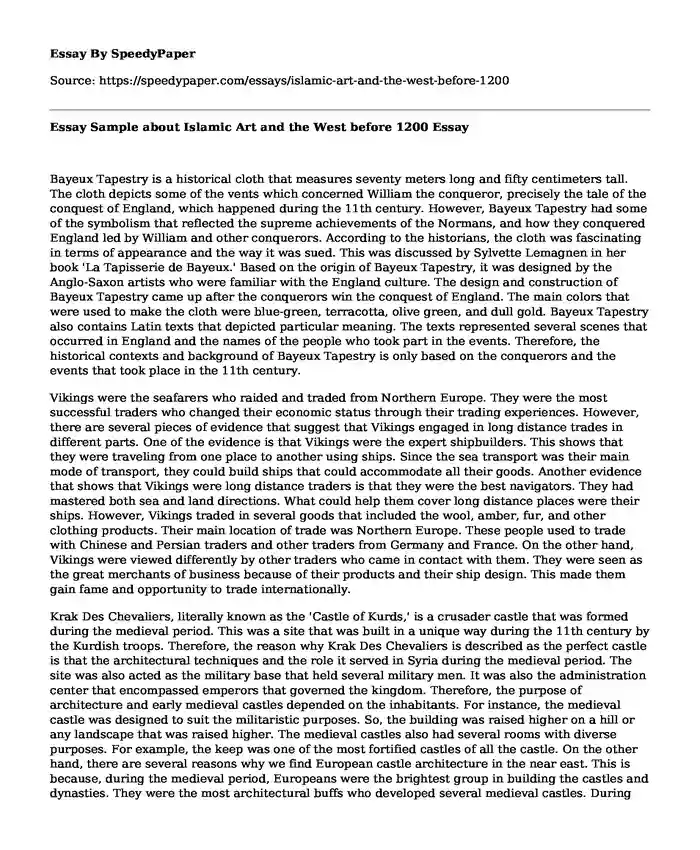Bayeux Tapestry is a historical cloth that measures seventy meters long and fifty centimeters tall. The cloth depicts some of the vents which concerned William the conqueror, precisely the tale of the conquest of England, which happened during the 11th century. However, Bayeux Tapestry had some of the symbolism that reflected the supreme achievements of the Normans, and how they conquered England led by William and other conquerors. According to the historians, the cloth was fascinating in terms of appearance and the way it was sued. This was discussed by Sylvette Lemagnen in her book 'La Tapisserie de Bayeux.' Based on the origin of Bayeux Tapestry, it was designed by the Anglo-Saxon artists who were familiar with the England culture. The design and construction of Bayeux Tapestry came up after the conquerors win the conquest of England. The main colors that were used to make the cloth were blue-green, terracotta, olive green, and dull gold. Bayeux Tapestry also contains Latin texts that depicted particular meaning. The texts represented several scenes that occurred in England and the names of the people who took part in the events. Therefore, the historical contexts and background of Bayeux Tapestry is only based on the conquerors and the events that took place in the 11th century.
Vikings were the seafarers who raided and traded from Northern Europe. They were the most successful traders who changed their economic status through their trading experiences. However, there are several pieces of evidence that suggest that Vikings engaged in long distance trades in different parts. One of the evidence is that Vikings were the expert shipbuilders. This shows that they were traveling from one place to another using ships. Since the sea transport was their main mode of transport, they could build ships that could accommodate all their goods. Another evidence that shows that Vikings were long distance traders is that they were the best navigators. They had mastered both sea and land directions. What could help them cover long distance places were their ships. However, Vikings traded in several goods that included the wool, amber, fur, and other clothing products. Their main location of trade was Northern Europe. These people used to trade with Chinese and Persian traders and other traders from Germany and France. On the other hand, Vikings were viewed differently by other traders who came in contact with them. They were seen as the great merchants of business because of their products and their ship design. This made them gain fame and opportunity to trade internationally.
Krak Des Chevaliers, literally known as the 'Castle of Kurds,' is a crusader castle that was formed during the medieval period. This was a site that was built in a unique way during the 11th century by the Kurdish troops. Therefore, the reason why Krak Des Chevaliers is described as the perfect castle is that the architectural techniques and the role it served in Syria during the medieval period. The site was also acted as the military base that held several military men. It was also the administration center that encompassed emperors that governed the kingdom. Therefore, the purpose of architecture and early medieval castles depended on the inhabitants. For instance, the medieval castle was designed to suit the militaristic purposes. So, the building was raised higher on a hill or any landscape that was raised higher. The medieval castles also had several rooms with diverse purposes. For example, the keep was one of the most fortified castles of all the castle. On the other hand, there are several reasons why we find European castle architecture in the near east. This is because, during the medieval period, Europeans were the brightest group in building the castles and dynasties. They were the most architectural buffs who developed several medieval castles. During then, their place of architecture was the near east. That is why some of the castles are still found in that place until date.
The Holy Roman Empire was one of the empires that were built by the Roman Emperors, particularly the Ottonian Emperors. The rulers of the Roman Empire, German Kingdom, and East Francia were the Otto I, II, and III. They all built the Holy Roman Empire to mark their leadership in every phase from 963 to 1000BC. Therefore, the purpose of the Holy Roman Empire was that it was founded as the revival place that was used to crown the Imperator after the collapse of the Western Roman Empire. However, one of the challenges that the Holy Roman Empire faced was a growing power. This was their greatest threat because popes could challenge kings regarding their control and legitimacy. Another challenge was lack of connections between lands. In other words, geography mattered most. The empire lacked good roads that could lead the emperors to their lands. On the other hand, there are several artifacts that can tell us about the ideas that the Holy Roman Empire was built upon. These include the stones, architectural building, and sites that exist in the modern world. The historic sites that have been enclosed as museums are the examples of the existence of the Holy Roman Empire with several artifacts.
Cite this page
Essay Sample about Islamic Art and the West before 1200. (2022, May 19). Retrieved from https://speedypaper.com/essays/islamic-art-and-the-west-before-1200
Request Removal
If you are the original author of this essay and no longer wish to have it published on the SpeedyPaper website, please click below to request its removal:
- Essay Example on Listening Skills in Conflict Management
- Free Essay on Public Speaking: What I Know, Assume, or Imagine
- Free Essay about The Marine Corps Doctrinal Publication 1 and San Pasqual War
- Free Essay with Wellness Reflection
- Delinquency Prevention Paper Sample
- Reflection on 'Facing Up the American Dream'
- Paper Example: What Marketing Strategy Is Pepsi Using?
Popular categories





